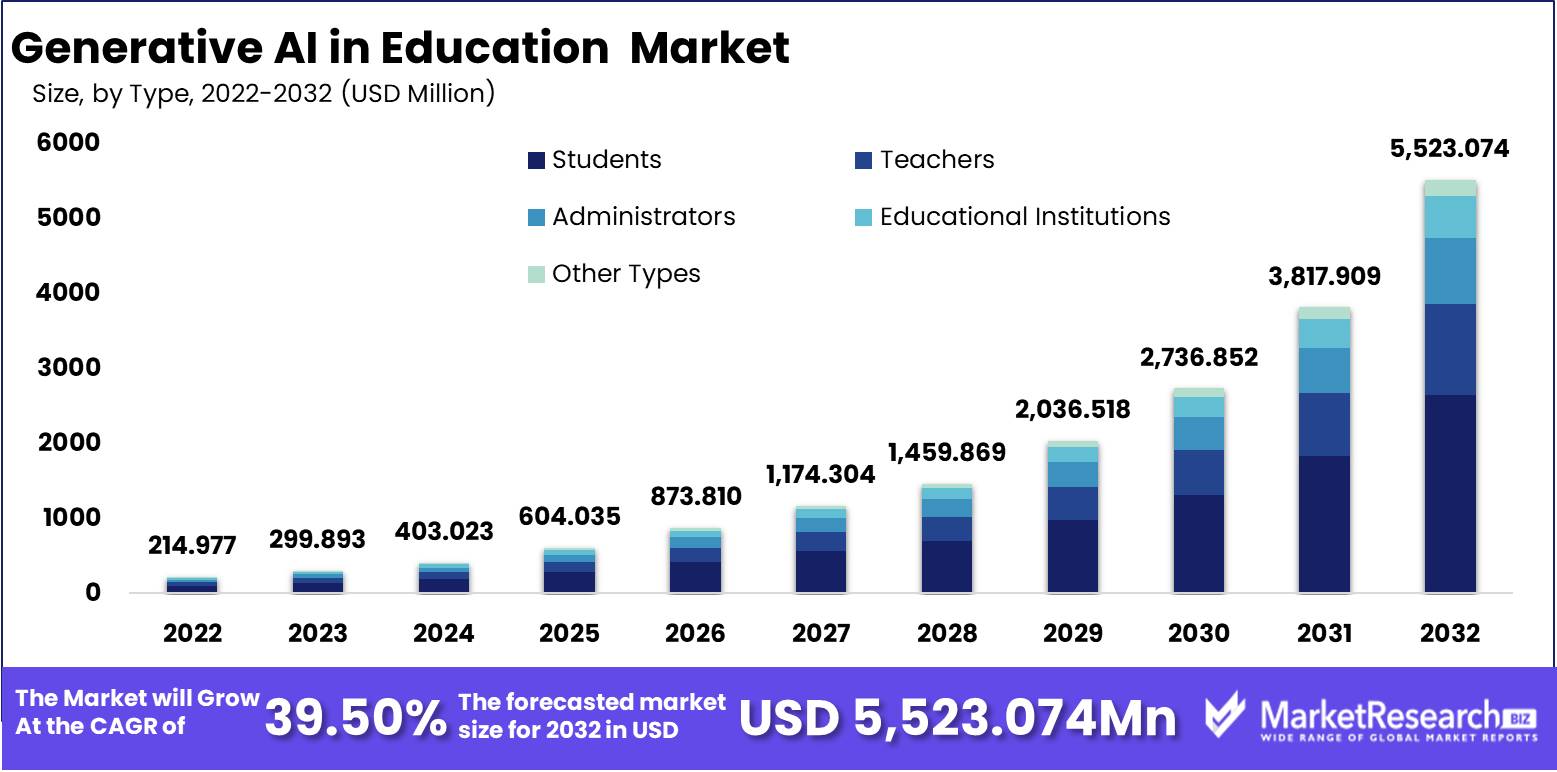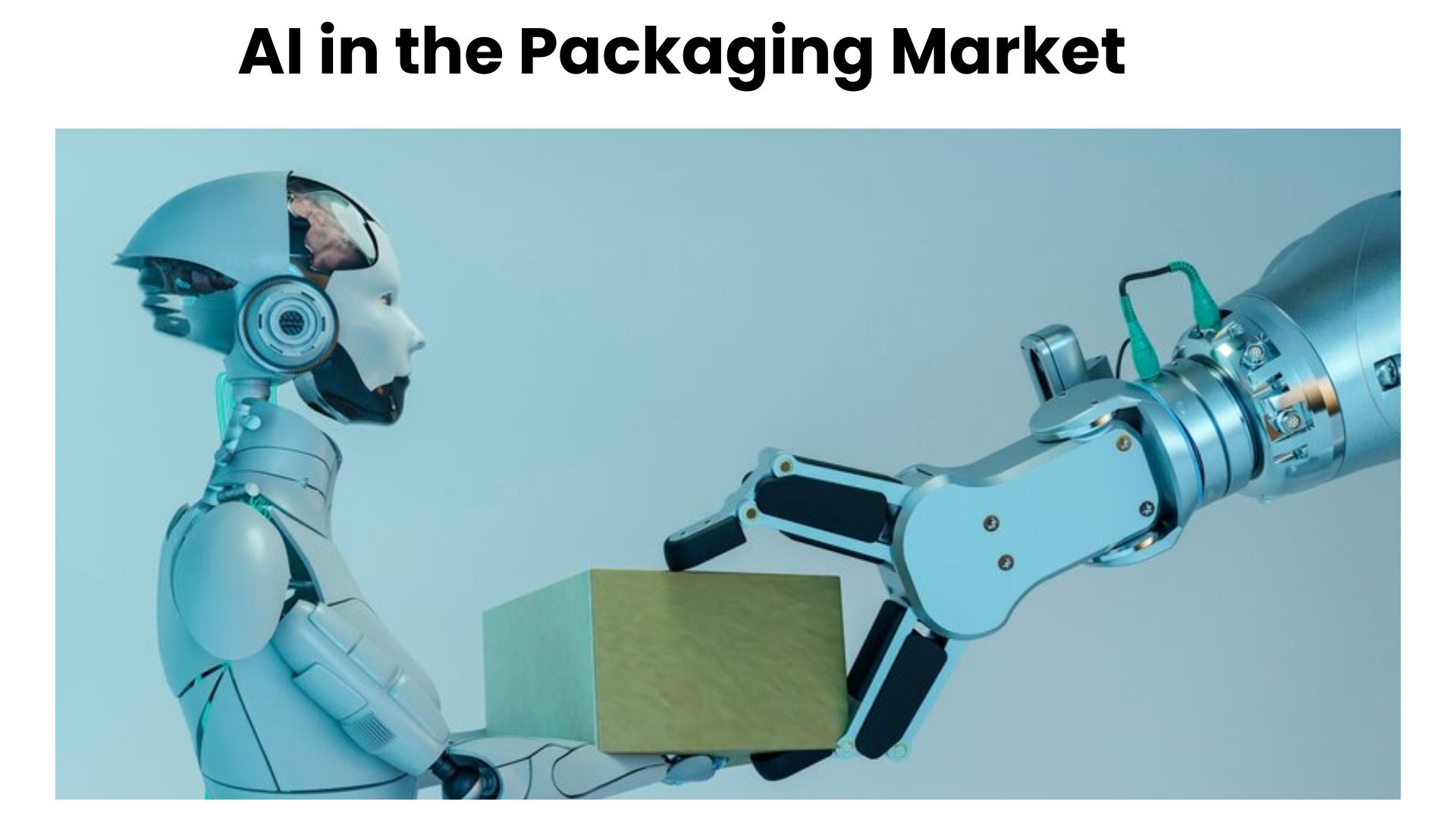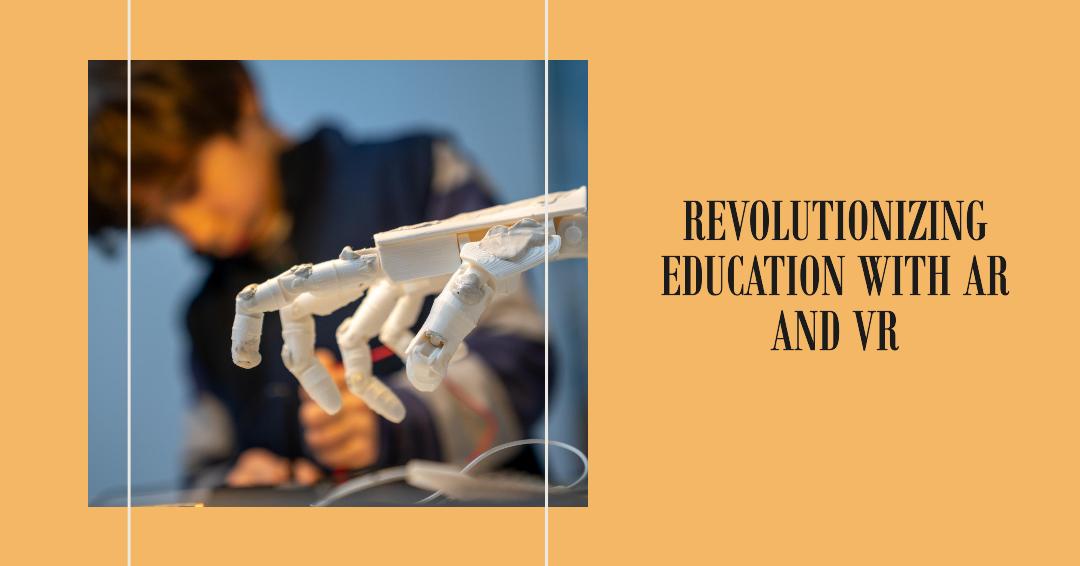Generative AI in Education Market Hit USD 5,523.074 Mn by 2032 | CAGR 39.50%

Page Contents
Market Overview
Published Via 11Press : Generative AI in Education Market size is expected to be worth around USD 5,523.074 Mn by 2032 from USD 214.9 Mn in 2022, growing at a CAGR of 39.50% during the forecast period from 2023 to 2032.
Generative artificial intelligence (AI) has emerged as an attractive technology in education, providing personalized learning experiences and content generation opportunities. The market for generative AI in education has seen rapid expansion over the years, and is predicted to see continued expansion over time.
One of the primary drivers behind generative AI's adoption in education is its capacity to deliver personalized learning experiences. By analyzing student data and patterns of study, generative AI systems can generate content tailored to meet each student's individual needs, learning style and pace – increasing student engagement while simultaneously improving learning outcomes.
Intelligent tutoring systems powered by generative AI have long been a mainstay in education. Acting like virtual tutors, these systems offer students interactive and adaptive learning experiences with real-time feedback, guidance, and customized learning paths tailored specifically to individual strengths and weaknesses. Intelligent tutoring systems equipped with generative AI also effectively simulate one-on-one tutoring sessions to offer personalized support and assistance for every student enrolled in them.
Generative AI also aids educators in the generation of content for educational use. By employing generative AI systems to quickly create and curate educational material more efficiently – quizzes, assessments, interactive learning materials or even virtual simulations – educators can save both time and effort while still offering high-quality, engaging material for their students.
The global AI education market, including generative AI applications, is projected to reach a considerable valuation. This growth will be fuelled by rising adoption of AI technologies within education institutions as well as rising demand for personalized and adaptive learning solutions.
Request a Sample Copy of the Generative AI in Education Market Report at: https://marketresearch.biz/report/generative-ai-in-education-market/request-sample/
Key Takeaways
- Generational AI allows for personalized learning experiences by analyzing student data and producing tailored content and recommendations.
- Intelligent tutoring systems powered by generative AI provide real-time feedback, guidance, and tailored learning paths based on an individual's strengths and weaknesses.
- Generative AI supports educators in more efficiently creating and curating educational content – including quizzes, assessments, and interactive learning materials.
- Generative AI solutions in education are being driven by an increase in demand for personalized and adaptive learning solutions.
- Generative AI enhances student engagement and improves learning outcomes.
- The growth of generative AI in education market is propelled by the increased adoption of AI technologies within the education sector.
Regional Snapshot
North America has long been considered a pioneering region when it comes to adopting generative AI in education, with particular growth witnessed in the United States due to the presence of prominent tech companies, a robust education system and focus on integrating tech into classrooms. Generative AI solutions have been implemented for multiple uses within classrooms – personalized learning systems, tutoring systems, automated essay grading and content generation are just a few applications for these solutions.
Europe has also shown considerable enthusiasm for generative AI applications for education, with countries such as Britain, Germany and France actively exploring and incorporating these technologies in their educational systems. Furthermore, Europe's emphasis on digital transformation as well as investment in AI research and development have only helped propel its widespread expansion across this region.
Asia-Pacific nations such as China, India and South Korea have been at the forefront of adopting generative AI for education purposes. China in particular has made substantial investments in AI technology for education purposes with initiatives like AI-powered smart classrooms and intelligent tutoring systems; along with a growing student population that requires personalized education. Generative AI solutions have proven particularly popular within these nations due to this region's large student population and demand.
Latin America may be behind other regions when it comes to adoption of generative AI for education purposes; however, there remains substantial room for expansion. Countries such as Brazil and Mexico have demonstrated interest in using AI technologies in education practice – although infrastructure constraints or resource shortages could slow this pace of adoption in certain places.
Middle East and Africa countries have seen varied adoption levels of generative AI in education. Countries like United Arab Emirates and Saudi Arabia have invested in AI technologies and are investigating their educational applications; overall adoption in this region remains relatively moderate due to factors such as disparate technological infrastructure levels and educational disparities.
For any inquiries, Speak to our expert at: https://marketresearch.biz/report/generative-ai-in-education-market/#inquiry
Drivers
Generative AI allows for personalized learning experiences by analyzing student data and producing tailor-made content, recommendations and assessments that meet each learner's individual style, pace and needs – increasing engagement while improving learning outcomes.
Intelligent Tutoring Systems: Generative AI powers intelligent tutoring systems that offer students tailored guidance and feedback. These systems mimic one-on-one tutoring experiences by offering adaptive learning paths and immediate assistance, leading to increased knowledge retention and academic performance.
Automated Grading and Feedback: Generative AI's automated grading capability makes life simpler for educators while speeding up assessment turnaround times. By evaluating student responses quickly and providing timely, consistent feedback to educators – saving educators precious time while making assessment turnaround faster than ever.
Content Generation: Generative AI has the capacity to generate educational content such as lesson plans, exercises and study materials. Furthermore, it can generate interactive simulations, virtual environments and multimedia resources which enhance learning experiences for both students and educators and foster creativity among both.
Data-Driven Insights: Generative AI can quickly analyze large volumes of educational data, such as student performance data, to uncover patterns, trends, and insights that enable educators to make data-informed decisions, refine instructional strategies and implement targeted interventions that support student progress.
Restraints
- Ethical Considerations: Generative AI raises ethical concerns, especially regarding data privacy, security, and the potential biases embedded in AI algorithms. There is a need to ensure that student data is protected, AI models are transparent and explainable, and that AI systems do not perpetuate inequalities or biases in educational outcomes.
- Limited Access to Technology: Not all educational institutions have access to the necessary technology infrastructure and resources required for implementing generative AI solutions. Unequal access to technology and internet connectivity can hinder the widespread adoption of generative AI in some regions or schools, creating a digital divide.
- Integration Challenges: Integrating generative AI systems into existing educational frameworks and workflows can be complex and time-consuming. It may require significant changes in infrastructure, teacher training, and curriculum development, which can pose challenges for schools and institutions with limited resources.
Opportunities
- Generative AI Enables Scalable Customized Learning Experiences: Generative AI offers personalized learning experiences at scale for students. By analyzing large amounts of data and customizing learning content and approaches specific to individual student needs, generative AI gives educators a way to deliver tailored instruction and support while increasing engagement levels and boosting learning outcomes.
- Adaptive Assessment and Feedback: Generative AI has revolutionized assessment practices by providing adaptive and instant feedback to students. AI-powered assessment systems can analyze student responses to provide targeted interventions as well as gain a deeper understanding of individual learning gaps.
- Intelligent Content Creation: Generative AI can automate the production of educational materials such as lesson plans, quizzes and study materials – providing educators with time and creativity back so they can focus on higher-level instructional design or individualized support services instead of producing content themselves.
- Generative AI can enhance virtual and augmented reality (VR/AR) experiences in education by creating realistic virtual environments, simulations and interactive scenarios – creating immersive learning experiences which engage and motivate students.
- Data-Driven Decision Making: Generative AI provides educators with valuable insights and analytics by analyzing educational data. This enables educators to make data-informed decisions regarding curriculum design, teaching strategies, student interventions and overall educational practices for continuous improvement in practice.
Take a look at the PDF sample of this report: https://marketresearch.biz/report/generative-ai-in-education-market/request-sample/
Challenges
- Technical Expertise and Training: Integrating Generative AI solutions in education requires educators and administrators to have an in-depth knowledge of AI concepts and capabilities, so a lack of technical expertise or training may impede its adoption or use effectively in educational settings.
- Resource Limitations: Implementing generative AI in education may require substantial investments in infrastructure, computing power, software, and training; educational institutions with limited resources may face financial restraints when adopting and maintaining such technologies.
- Cultural Acceptance and Trust: For the successful implementation of generative AI systems among students, parents, and educators to take place effectively, their acceptance is vitally important. Overcoming skepticism about artificial intelligence replacing human teachers, and assuring transparency and explainability are among many challenges in creating trust between school communities and AI models is paramount in building acceptance and trust between all involved.
- Legal and Regulatory Frameworks: Generative AI in education is subject to legal and regulatory frameworks pertaining to data protection, privacy and intellectual property rights. Adherence to such frameworks as the General Data Protection Regulation (GDPR) or Family Educational Rights and Privacy Act (FERPA) presents significant challenges when collecting, storing and using student data.
Market Segmentation
Based on Type
- Students
- Teachers
- Administrators
- Educational Institutions
- Other Types
Based on Application
- Adaptive Learning
- Content Generation
- Automated Grading
- Personalized Tutoring
- Virtual Simulations
- Intelligent Learning System
- Other Applications
Based on Technology
- Natural Language Processing
- Machine Learning
- Computer Vision
- Other Technologies
Based on Deployment Mode
- On-Premise
- Cloud-Based
Key Players
- IBM Corporation
- Microsoft Corporation
- Google LLC
- Cognii Inc.
- Knewton
- Blackboard
- Metacog Inc.
- Duolingo
- Other Market Players
Report Scope
| Report Attribute | Details |
| Market size value in 2022 | USD 214.9 Mn |
| Revenue Forecast by 2032 | USD 5,523.074 Mn |
| Growth Rate | CAGR Of 15.4% |
| Regions Covered | North America, Europe, Asia Pacific, Latin America, and Middle East & Africa, and Rest of the World |
| Historical Years | 2017-2022 |
| Base Year | 2022 |
| Estimated Year | 2023 |
| Short-Term Projection Year | 2028 |
| Long-Term Projected Year | 2032 |
Request Customization Of The Report: https://marketresearch.biz/report/generative-ai-in-education-market/#request-for-customization
Recent Developments
- OpenAI and Educational Institutions: OpenAI has collaborated with multiple educational institutions over time. OpenAI researchers and educators have explored applications of generative AI for education purposes such as personalized learning, content generation and intelligent tutoring systems.
- Google and Educational Platforms: Google has collaborated with educational platforms and institutions to incorporate generative AI capabilities into their services, such as providing AI-powered content recommendations, personalized feedback, and automated grading on online learning platforms.
- IBM and Educational Institutions: IBM has collaborated with educational institutions to develop and implement AI solutions in education, including personalized learning, virtual tutoring and adaptive assessments. Watson AI platform has also been utilized within educational settings to increase student engagement and learning outcomes.
- Microsoft and Education Technology Companies: Microsoft has formed partnerships with education technology companies to integrate generative AI capabilities into their platforms and tools, with the intention of improving teaching and learning experiences through content generation, adaptive learning systems and intelligent tutoring systems.
FAQ
What is Generative AI in Education?
Generative AI in education refers to the application of artificial intelligence techniques such as deep learning and natural language processing to create content, provide personalized learning experiences and support educational processes. Generative AI employs AI algorithms for the generation of educational materials tailored specifically for individual learners as well as intelligent tutoring systems.
How is Generative AI being applied in education?
Generative AI is being utilized in education for various applications. It can generate educational materials like lesson plans, quizzes and study materials; power intelligent tutoring systems which offer personalized guidance and feedback for each student; automate grading processes such as adaptive assessments or create personalized learning pathways.
What are the advantages of using generative AI for education purposes?
Generative AI offers several advantages for education. It enables customized learning experiences tailored to the unique needs and learning styles of individual students. Furthermore, its automation of time-consuming tasks such as content production and grading helps free up teachers' time for other pursuits. Generative AI also improves engagement by offering immediate feedback loops while supporting data-driven decision making for improved learning outcomes.
What are the potential obstacles associated with using generative AI for education purposes?
Implementing generative AI into education poses multiple obstacles, such as ethical considerations regarding data privacy and algorithmic bias. Integrating AI systems into existing educational infrastructure and workflows may prove complex; limited access to technology, resource constraints, as well as educator training needs all pose formidable hurdles that need to be met head on.
How does Generative AI ensure fairness and mitigate biases in educational applications?
Fairness in AI applications is of utmost importance, so ensuring fairness and preventing biases should be a top priority. This requires careful data selection, preprocessing, and ongoing monitoring of AI models. Techniques like bias mitigation algorithms, fairness metrics and diverse data representation may be employed to reduce biases and promote equitable educational experiences.
Can AI replace human teachers in education?
Generative AI does not aim to replace human teachers, but instead enhances their capabilities. Generative AI can automate certain tasks, provide personalized support and generate insights based on data analysis; however, human teachers still play an essential role in providing guidance, creativity, critical thinking skills and social-emotional support that cannot be replicated through AI technology.
What can be expected in terms of future developments with respect to AI in education?
Future prospects of generative AI in education look bright. As AI technologies advance, more educational settings will likely adopt and incorporate this form of artificial intelligence to enhance personalized learning, adaptive assessments, intelligent tutoring systems and AI-powered content generation for more effective and engaging educational experiences.
Contact us
Contact Person: Mr. Lawrence John
Marketresearch.Biz
Tel: +1 (347) 796-4335
Send Email: [email protected]
Content has been published via 11press. for more details please contact at [email protected]
The team behind market.us, marketresearch.biz, market.biz and more. Our purpose is to keep our customers ahead of the game with regard to the markets. They may fluctuate up or down, but we will help you to stay ahead of the curve in these market fluctuations. Our consistent growth and ability to deliver in-depth analyses and market insight has engaged genuine market players. They have faith in us to offer the data and information they require to make balanced and decisive marketing decisions.



